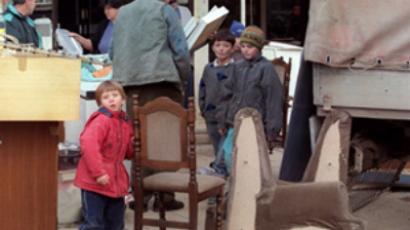The split within: Two years on since Kosovo declared independence
The second anniversary of Kosovo's self-proclaimed independence comes amid concerns over its legal status.
Pristina, its capital, has launched a campaign to boost its international recognition. Meanwhile, in the Serb-dominated northern region of Mitrovica, divisions are as great as ever.
Two years after Kosovo’s declaration of independence, the region still looks like a playing field for the world powers. On one bank of the Ibar River the Albanian black eagle is propped up by the West, on the other side – Serbian defiance rests on Russia's tricolor and the omnipresent portraits of its prime minister.
Kosovska Mitrovica
A city in northern Kosovo, divided between ethic-Albanians in the south and ethnic-Serbs in the north after the end of Kosovo war in 1999
“Instead of Serbs and Albanians deciding on their future, the fate of Kosovo is being determined thousands of kilometers away. And if we could choose, we'd prefer the decision to be made at the UN, rather than Washington; or in the Hague, rather than in Brussels,” notes Zdravko Vitosevic from the University of Pristina in Mitrovica.
Day after day there is the same scene in the town of Mitrovica – vehicles stop to change number plates before crossing over to the Albanian side. When Kosovo Albanians gained independence, Kosovo Serbs lost their freedom of movement.
“This road is very dangerous. When they see cars from the Serbian part, Albanians honk their horns and even hurl stones at us,” Verolub Miletic, Mitrovica resident, told RT.
Verolub couldn't visit his home village for 10 years. To get there, he has to pass through many Albanian settlements – a risky undertaking – but as he drives through the land his family owned for generations, he forgets about security.
“We had to leave our house when NATO forces [came] in 1999 – it was a nightmare,” Verolub observes.
His father's home was looted and destroyed; his former Albanian neighbors took over the farm.
A few miles further lies Osojane village, which is the only Serbian settlement left in the area where neighbors cling together in order to survive. Like many Serbian villages, it has a patron saint and a day to worship him.
Tables overflow with food, but what the villagers there are really hungry for is some form of official dialogue. The families’ resolve to live on their land comes at a high price.
“Our village is a prison with a handful of inmates… People who used to live here are afraid of returning. And we are afraid to send our kids to school, afraid to go to a nearby village,” said Lubisa Dosic, resident of Osojane village.
Intimidation by Albanian neighbors and police negligence are their chief complaints. They believe the Kosovo authorities are trying to push them out. Yet, they are bent on staying, even if it means the pursuit of their own independence – this time from Kosovo.
Zivadin Jovanovic, the last Yugoslavian Foreign Minister (1998-2000), believes Kosovo is the most serious security issue today in Europe and one of the most serious problems in the world.
“This NATO creation can not survive without finding a compromise,” he said. “And a compromise is possible, but there’s need to respect resolution 1244 of Security Council from 1999, which guarantees substantially autonomy for Kosovo, but the integrity and sovereignty of Serbia.”













